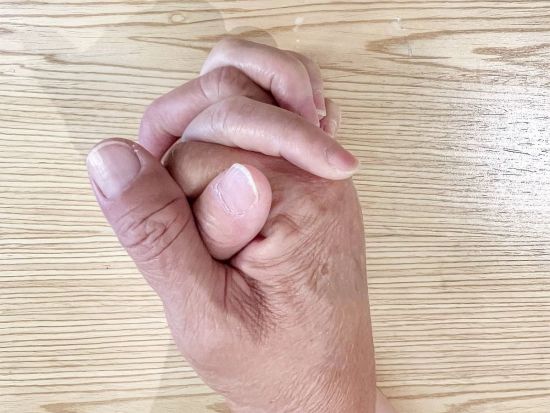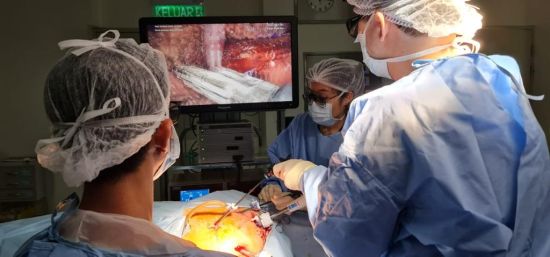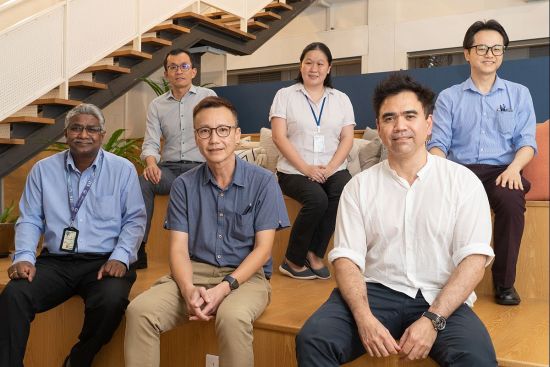How A Malaysian With HIV Overcame Barriers To Get A Kidney Transplant
By Alifah Zainuddin and Saw Siow Feng | 12 April 2023
Mr Chew (pseudonym) – the first person living with HIV to receive a kidney transplant in Malaysia – shares how he and his wife persisted for the surgery despite rejections from multiple hospitals locally and abroad, until UMMC stepped up to the challenge.

For Mr and Mrs Chew (pseudonym), their journey has taught them to appreciate the gift of life, especially time and health. Photo by Saw Siow Feng for CodeBlue.
KUALA LUMPUR, April 12 – Last year, Mr Chew (pseudonym) made history by becoming the first person living with HIV to successfully receive a kidney transplant in Malaysia – at University Malaya Medical Centre (UMMC).
Nearly four decades since the first HIV case was reported in the country, people living with HIV continue to face discrimination and stigma in accessing health care. Mr Chew’s journey to a life-saving transplant highlights this reality.
For years, he sought a kidney transplant, only to be denied repeatedly by doctors and hospitals, both locally and abroad, due to his HIV status.
Mr Chew and his wife, who spoke in a joint interview with CodeBlue last February, said they consulted over 20 doctors, all of whom declared the procedure impossible.
“I felt helpless and desperate. It felt like the end of the road. Fortunately, I have the support and encouragement of my wife. She has always been by my side,” said Mr Chew (surname changed to protect patient and his wife’s confidentiality).
Mrs Chew, who is HIV-negative, was the donor in the kidney transplant.
At the time, Mr Chew was struggling with kidney failure and undergoing peritoneal dialysis four times a day. “The dialysis process is not only dangerous and problematic, but it also prevents me from sleeping through the night. My body often feels cold to the bone, and my stomach is in excruciating pain most of the time. On one occasion, I even developed severe fluid in my lungs. That’s why I decided to pursue a kidney transplant,” explained Mr Chew.
“Every month, my husband was admitted to the hospital due to bacterial infections from the dialysis,” Mrs Chew recounted. “We consulted numerous doctors, including private practitioners, but one of them suggested that, given his age, we should let him continue with dialysis. It was a difficult time for us.”
It wasn’t until the couple met the team at UMMC that they finally found hope for the life-changing surgery that Mr Chew desperately needed. “I am very grateful to them for not giving up on us, HIV patients, and giving us new hope,” Mr Chew said.
The Kidney Transplant At UMMC

The operation team at University Malaya Medical Centre (UMMC) performing the donor surgery last year. Photo courtesy of Assoc Prof Dr Shanggar Kuppusamy, Head of the Surgery Department and Lead of Transplant Services at UMMC.
Due to Mr Chew’s HIV status, he and his wife had struggled in finding a hospital that was willing to perform a kidney transplant for him. They had contacted several major hospitals in Singapore, and other foreign hospitals, but all had refused to accept their case.
However, Mr Chew had heard that successful kidney transplants had been performed on HIV patients in the United States and Thailand, which gave them hope.
Finally, they were able to find support at UMMC. The team at UMMC was composed of medical experts in nephrology, infectious diseases, and urology. The university hospital had not performed a transplant on an HIV patient before, but they agreed to try.
The couple first approached Assoc Prof Dr Ng Kok Peng, consultant nephrologist at UMMC, who then consulted Assoc Prof Dr Raja Iskandar Shah Raja Azwa, infectious disease consultant at UMMC and president of the Malaysian AIDS Council.
“During the process, we also learned that we had to wait for a long time to get a transplant, not to mention that he was an HIV patient and that a wife transplanting to her husband would be the fastest and would eliminate the complicated application process. So I decided that I would donate my kidney,” Mrs Chew said.
After six months of preparation, including physical examinations and matching, Mrs Chew’s kidney was found to be suitable for Mr Chew, and they proceeded with the transplant.
“Before my wife was going to have the surgery, a minute before the doctor came and asked her if she would not regret it,” Mr Chew said.
“The doctor said if you want to cancel, no one will blame you,” Mrs Chew said. “But I said, no need to ask further, I have already decided.”
The surgery was successful, and after the recovery period, Mr Chew no longer needed dialysis and was feeling much healthier.
Immediate post-surgery care included frequent follow-up checks three times a week – every Monday, Wednesday and Friday. Once his condition became more stable, follow-up checks would take place every two weeks and, after that, once a month.
“The difference between before and after the dialysis is really big, now it’s like a normal person,” Mrs Chew said. Mr Chew said during dialysis, he could not consume more than 500ml of water and was very weak. “But after the transplant, I am very healthy.”
“Our children are also unaware of the situation, and we keep it a secret in order to protect them from potential stigma. We don’t talk about anything related to this condition at home, and the only health issue we’ve disclosed to our family is Mr Chew’s kidney failure.”
A New Hope

The team of medical experts in urology, nephrology, and infectious disease at the University Malaya Medical Centre (UMMC) who played a crucial part in carrying out Malaysia’s first kidney transplant on a patient living with HIV. Photo by Saw Siow Feng for CodeBlue.
It has been more than six months since the kidney transplant took place and Mr Chew is recovering well. He can eat, his weight is back to normal, and he is in good spirits.
“Now, wherever he goes, I will remind him when to drink water and what to eat – less oil, less sugar and less salt,” Mrs Chew said.
“Dr Iskandar encouraged us to be interviewed and said that the story of our transplant will help more people to know that people living with HIV with end-stage kidney disease should be given the same opportunities and access to health care as HIV-negative persons, including the right to have a kidney transplant to improve their quality of life,” Mr Chew said.
“As I am now, I am healthy even though HIV is still in my body, and we have a new hope coming up in April when we will finally travel abroad.”
Mrs Chew added: “We have been rejected by many doctors. Dr Iskandar said that by being interviewed, more doctors know that even HIV patients have the right to be treated. Dr Ng also encouraged us to talk about our experience so that others can be inspired to try it.
“We are very grateful to Dr Iskandar’s team, Dr Ng, Dr Lee Yee Wan (nephrologist), Dr Ng Rong Xiang (infectious disease physician) and the team of surgeons for their support and care throughout the whole process.”
For Mr and Mrs Chew, their journey has taught them to appreciate the gift of life, especially time and health. “Every day is a race against time, especially for those with HIV disease,” Mrs Chew said.
After Mr Chew’s kidney transplant, Mrs Chew realised that she needed to slow down and not always do everything on her own.
Mr Chew stopped smoking after his kidney transplant, realising the great sacrifice his wife made for him. He encourages others not to give up, as HIV treatment is effective, and there is still hope. “This kidney transplant is a return to life,” Mr Chew said.
Mrs Chew emphasised the importance of support and encouragement for persons living with HIV and highlighted that they can contribute to society.
“Very often, HIV patients are misunderstood by the public. As I said, when my husband first found out he had HIV, he thought he had been sentenced to death. So, do not reject HIV patients – they need more care and support in society, and they should enjoy life as normal people,” Mrs Chew said.
The couple’s unwavering belief in the right to life for all individuals is a powerful message that people living with HIV are entitled to the same level of care and support as any other living person.
Achieving equal access to health care treatment is vital to ensure that everyone, regardless of their HIV status, can live a healthy and meaningful life.
Contact:
Boo Su-Lyn
Editor-in-Chief
CodeBlue
sulyn@galencentre.org
Source: https://codeblue.galencentre.org/2023/04/12/how-a-malaysian-with-hiv-overcame-barriers-to-get-a-kidney-transplant/
"Reproduced with permission - CodeBlue"
CodeBlue
For more HIV and AIDS News visit...
Positively Positive - Living with HIV/AIDS:
HIV/AIDS News
|